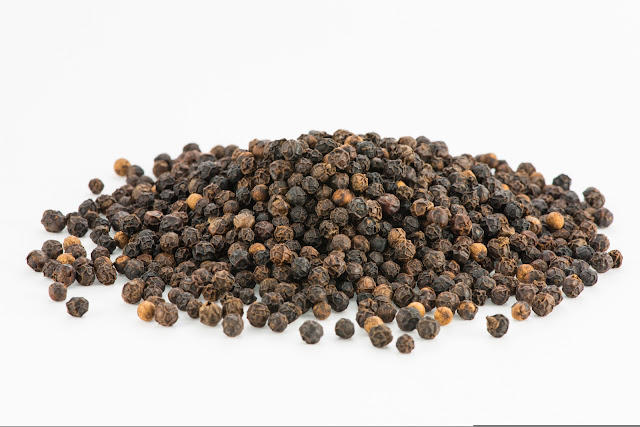 |
| imaginary picture |
Black pepper is not just a popular spice used in culinary applications; it also offers numerous potential health benefits. Here are some of the benefits of black pepper:
Digestive Health: Black pepper stimulates the secretion of digestive enzymes, promoting healthy digestion. It can help alleviate digestive issues like bloating, gas, and constipation.
Enhanced Nutrient Absorption: Black pepper contains a compound called piperine, which has been found to enhance the bioavailability and absorption of various nutrients, including vitamins and minerals. It can improve the overall effectiveness of your diet.
Antioxidant Properties: Black pepper is rich in antioxidants that can help protect the body against damage caused by free radicals. Antioxidants play a vital role in reducing inflammation, preventing chronic diseases, and supporting overall health.
Anti-inflammatory Effects: The piperine in black pepper has been shown to possess anti-inflammatory properties, which can help reduce inflammation in the body. Chronic inflammation is associated with various health issues, including arthritis, heart disease, and cancer.
Respiratory Health: Black pepper may help alleviate respiratory conditions such as asthma and bronchitis. It works by stimulating circulation and mucus flow in the respiratory tract, facilitating easier breathing.
Weight Management: Some research suggests that black pepper may aid in weight management. Piperine has been shown to inhibit the formation of fat cells, potentially contributing to weight loss and preventing weight gain.
Brain Health: Piperine may have beneficial effects on brain health. It has been shown to enhance cognitive function and improve memory in animal studies. Additionally, black pepper's antioxidant properties may help protect the brain from age-related damage.
Antibacterial Properties: Black pepper exhibits antibacterial properties that can help inhibit the growth of certain types of bacteria, including those responsible for foodborne illnesses. It can contribute to food safety and reduce the risk of bacterial infections.
It's important to note that while black pepper offers potential health benefits, individual results may vary. It is generally safe for consumption in moderate amounts, but excessive intake may cause digestive discomfort for some individuals. As with any dietary changes or supplements, it's best to consult with a healthcare professional or nutritionist for personalized advice.
 |
| Subscribe to our YouTube channel by clicking on the logo |






